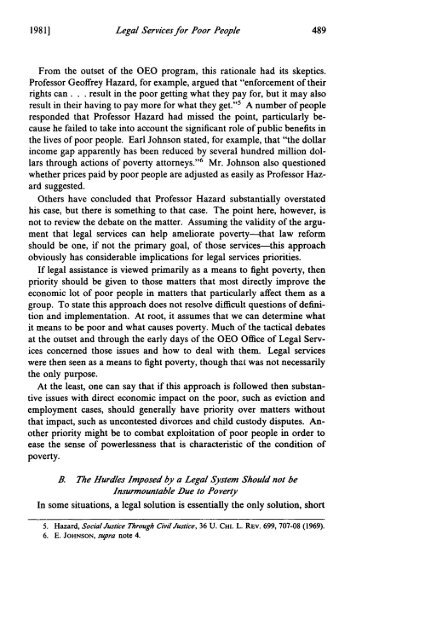Law for The Poor
Law for The Poor
Law for The Poor
Create successful ePaper yourself
Turn your PDF publications into a flip-book with our unique Google optimized e-Paper software.
1981l<br />
Legal Services<strong>for</strong> <strong>Poor</strong> People<br />
From the outset of the OEO program, this rationale had its skeptics.<br />
Professor Geoffrey Hazard, <strong>for</strong> example, argued that "en<strong>for</strong>cement of their<br />
rights can. . . result in the poor getting what they pay <strong>for</strong>, but it may also<br />
result in their having to pay more <strong>for</strong> what they get." 5 A number of people<br />
responded that Professor Hazard had missed the point, particularly because<br />
he failed to take into account the significant role of public benefits in<br />
the lives of poor people. Earl Johnson stated, <strong>for</strong> example, that "the dollar<br />
income gap apparently has been reduced by several hundred million dollars<br />
through actions of poverty attorneys. ' "6 Mr. Johnson also questioned<br />
whether prices paid by poor people are adjusted as easily as Professor Hazard<br />
suggested.<br />
Others have concluded that Professor Hazard substantially overstated<br />
his case, but there is something to that case. <strong>The</strong> point here, however, is<br />
not to review the debate on the matter. Assuming the validity of the argument<br />
that legal services can help ameliorate poverty-that law re<strong>for</strong>m<br />
should be one, if not the primary goal, of those services-this approach<br />
obviously has considerable implications <strong>for</strong> legal services priorities.<br />
If legal assistance is viewed primarily as a means to fight poverty, then<br />
priority should be given to those matters that most directly improve the<br />
economic lot of poor people in matters that particularly affect them as a<br />
group. To state this approach does not resolve difficult questions of definition<br />
and implementation. At root, it assumes that we can determine what<br />
it means to be poor and what causes poverty. Much of the tactical debates<br />
at the outset and through the early days of the OEO Office of Legal Services<br />
concerned those issues and how to deal with them. Legal services<br />
were then seen as a means to fight poverty, though that was not necessarily<br />
the only purpose.<br />
At the least, one can say that if this approach is followed then substantive<br />
issues with direct economic impact on the poor, such as eviction and<br />
employment cases, should generally have priority over matters without<br />
that impact, such as uncontested divorces and child custody disputes. Another<br />
priority might be to combat exploitation of poor people in order to<br />
ease the sense of powerlessness that is characteristic of the condition of<br />
poverty.<br />
B. <strong>The</strong> Hurdles Imposed by a Legal System Should not be<br />
Insurmountable Due to Poverty<br />
In some situations, a legal solution is essentially the only solution, short<br />
5. Hazard, Social Justice Through Civil Justice, 36 U. CHi. L. REv. 699, 707-08 (1969).<br />
6. E. JOHNSON, supra note 4.

















